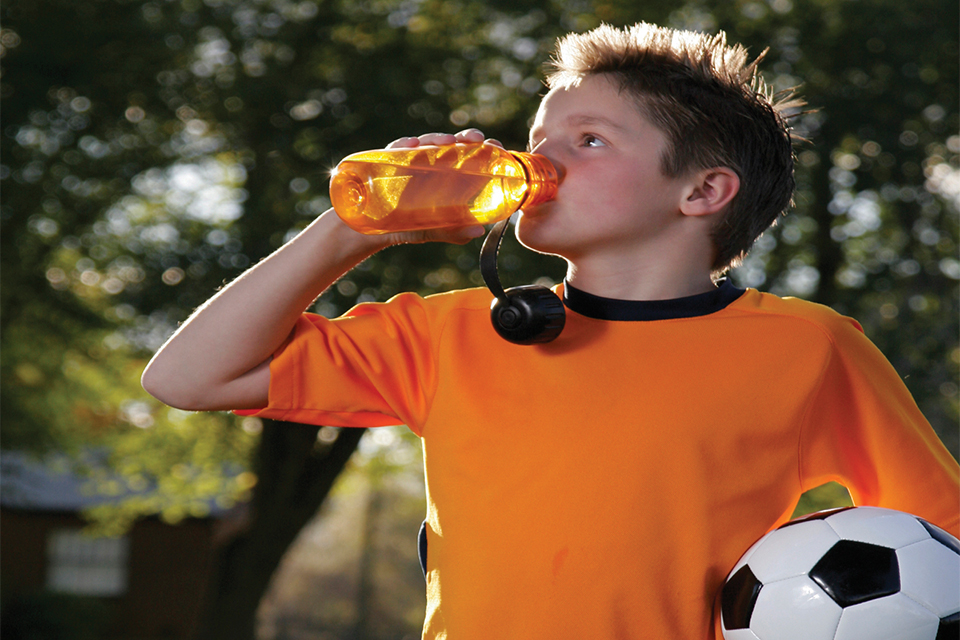Youth Hydration: Quenching Thirst On and Off the Field

August in Texas is kickoff season for back-to-school youth sports, which means teen athletes are practicing in 95 degree-plus temperatures that include humidity levels rivaling those found in Houston. When it comes to sports nutrition, the best way to capture a teen’s attention is to ask a question: Are you interested in hearing how to improve performance without really working harder?
I have yet to meet a teen—or adult, for that matter—who isn't interested in hearing the answer. Proper hydration leads to better performance.
Adult athletes spend a lot of time talking about hydration and how it may help their athletic endeavors, but it’s important to specifically look at how young athletes can stay hydrated through hot and humid practices and games.
Here are some guidelines to help create an individualized hydration schedule.
Starting Out
First and foremost, teens need to avoid dehydration. The night before a game or morning of practice is not the time to start making up for sweat loss that happened during the previous day. Make sure your young athlete is drinking water throughout the week—even when not practicing or playing in games. Showing up for practice or a game already behind on fluid intake will make the session harder, cause early fatigue and electrolyte imbalance, and may alter attention and decision-making on the field. It also greatly increases the risk of dehydration. A 1 to 2 percent loss in body weight indicates dehydration and can lead to a decrease in performance.
Sports, Cardiovascular and Wellness Nutrition (SCAN), a branch of the Academy of Nutrition and Dietetics, recommends teen athletes consume between 8 and 20 ounces of water or sports drink an hour before exercise.
During Sports
Suzanne Nelson, SC.D. R.D, encourages kids to drink on a schedule, not only when thirsty. “Thirst is not an accurate measure of a child’s need for fluid,” she explained. “By the time your child says he or she is thirsty, [he or she is] already dehydrated. Consuming fluids at regular intervals during exercise protects your child’s health and optimizes athletic performance.”
The American Academy of Pediatrics recommends that:
9 to 12 year olds should drink 3 to 5 ounces of fluid every 20 minutes.
Teens should drink 5 to 6 cups of water or sports drink each hour.
It’s useful to find out how often your child’s coach schedules hydration breaks to plan accordingly. To gauge how much fluid they may be consuming at each break, teach young athletes that one “kid-sized gulp” is equal to about half an ounce and one “adult-sized gulp” is equal to approximately one ounce. If athletes use their own bottles instead of a drinking from a cup or water cooler, you can get a better idea of fluid consumption by checking the bottle after practice.
What about Gatorade or other electrolyte-replacement beverages? For practices lasting longer than an hour or “two-a days,” research shows that sports drinks with electrolytes (such as Gatorade) become more palatable than water; as a result, athletes are more likely to drink them. These beverages also help young athletes replace electrolytes lost through sweat and provide carbohydrates to help prevent fatigue. Test out different brands and flavors to find which sports drink your teen likes best.
Post Workout
Checking weight before and after exercise can help young athletes get an estimate of their sweat rate during a typical practice or game. Remind them that humid days will increase sweat rates and can lead to a rapid loss of fluids. Replace the liquids lost during practice or a game within two hours after physical activity has ended by having them drink at least 16 to 24 ounces of water or sports drink for every pound of weight lost.
Advise children to check their own hydration by noting the color of their urine. Urine should be pale yellow to clear if they are adequately hydrated. (Note that B vitamins will affect urine color, so first thing in the morning is not the best time to check.)
Proper hydration, along with good nutrition and sleep, gives adult and youth athletes alike a healthy and strong physical foundation—the best building block for success.






